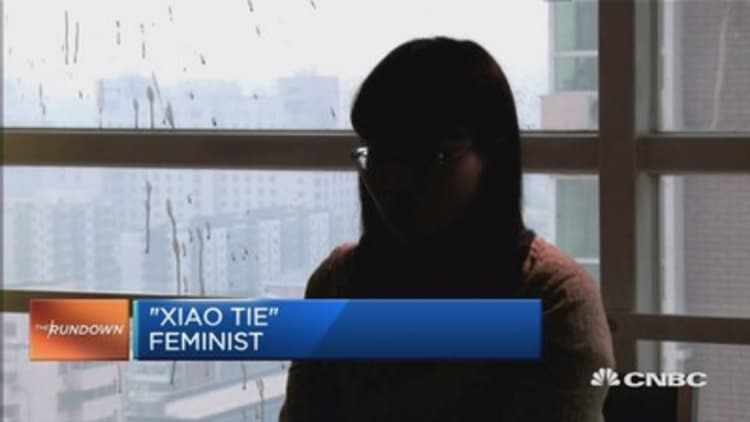
Chairman Mao may once have proclaimed that "women hold up half the sky," yet gender equality and women's rights remain a tricky issue in modern China, and for international relations.
On Sunday President Xi Jinping's capped his week-long visit to the United States by giving the opening remarks at a U.N. Women conference, then chairing a session on gender equality and female empowerment.
Xi told the meeting: "As the Chinese people pursue a happy life, all Chinese women have the opportunity to excel in life and make their dreams come true," adding that China would donate $10 million to U.N. Women, which is the United Nations' body on gender equality.
Xi's presence at the meeting sparked a sharp response from 2016 U.S. presidential candidate Hillary Clinton, who tweeted his attendance was "shameless."
The meeting came 20 years after Clinton famously made her Women's Rights are Human Rights speech at a key U.N.conference on female empowerment hosted by Beijing. This conference saw the adoption of the Beijing Declaration and Platform for Action, a roadmap for gender equality and female empowerment that was subsequently adopted by 189 governments.
Yet Xi's crackdown on activists just this year has raised questions about the true progress of women's rights in China.
In March five activists known as the Feminist Five were arrested two days before International Women's Day, for organizing multi-city protests against sexual harassment on public transport. They were detained for more than a month and charged by the police for "picking quarrels and provoking troubles."
Although subsequently released, the five remain criminal suspects, according to Associated Press (AP).
The Feminist Five were prominent organizers of several women's rights campaigns, such as tackling domestic violence by protesting in blood-stained wedding dresses, and calling for more female public toilets to be built, by occupying men's bathrooms.
The women's detainment sparked international criticism, with Clinton calling for the women's release and the U.S. Secretary of State John Kerry telling China they should "support [the feminists] and not silence them."
Read More
Clinton was not alone in her criticism of Xi's presence at the U.N. conference.
"It's just very galling to have the U.N. and U.N. Women partner with such a country that just does not respect women's rights and that does not respect or try and protect women human rights defenders," Frances Eve, a Hong Kong-based researcher at Chinese Human Rights Defenders, told AP.
And Chinese female activists say that the government's words are not matched by a true commitment to equality of the sexes.
"Our government's true attitude towards women's rights is not aligned with what they say the policies," Xiao Tie, a Chinese feminist who preferred to use an alias, told CNBC. "Women's rights will no doubt remain a very sensitive issue [as] there is pressure to stop [feminist] events and the police [will] question you," she added.
When AP asked U.N. Women about this criticism, the group responded that it "fully supports the rule of law and the right to a fair and prompt trial by all prisoners, including female prisoners." U.N. Women plans to track progress on commitments made on gender equality by leaders who attended the weekend's conference.
And Li Junhua, the director general of the department of international organisations and conferences within China's Foreign Ministry, told Reuters that some criticisms on women's rights in China were ill-informed.
"I believe the people in the best position to judge the state of women's issues in China are Chinese people, particularly Chinese women," Reuters quoted Li as saying.
Politics aside, making bigger moves to tackle inequality could reap huge rewards for China, according to a report released last week by the McKinsey Global Institute.
Read MoreStrategist: China fears way overblown
Closing the gender gap "has the potential to boost GDP in 2025 by $2.5 trillion," Anu Madgavkar, senior fellow of the McKinsey Global Institute, told CNBC.
China's Gender Parity Score is 0.61, with gender parity represented by 1.00, according to the McKinsey report on the economic potential of advancing female equality.
While China ranks higher on gender equality than regions including Sub-Saharan Africa, India and South Asia, it lags behind the best-performing region, North America and Oceania, which had a score of 0.74.
The report also highlighted that China had extremely high inequality indicators in some areas, including too few women in leadership positions and in politics, and that women spent significantly more time than men in unpaid care work.
- Reuters and Associated Press contributed to this report.
Follow her on Twitter @Aza_wee


